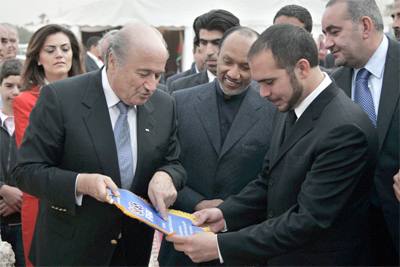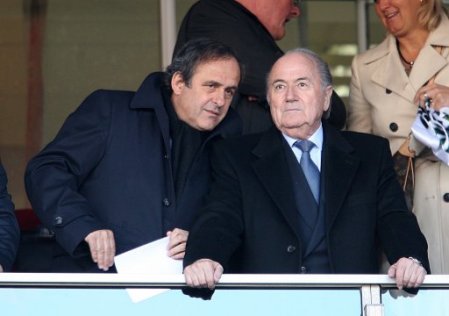The FIFA Presidential election will turn on two words: Goal Project.
This was Sepp Blatter’s great idea, energetically pushed by him ever since he got elected as President. But, and this is crucial, it was run by Mohammed Bin Hammam. The Qatari can win if, through his stewardship of the project, he has built such support in FIFA that he can undercut Blatter, particularly in the small organisations round. It is a big if.
Yes, the election will see much talk of transparency and reforming FIFA. We have had such talk before and Bin Hammam is already engaged on such campaign themes.
Bin Hammam will present himself as a moderniser. But at the end of the day he knows, and Blatter fears, that it is the Goal Project and how Bin Hamman may have boosted his election chances by administering it, that will turn the election.
The Goal Project is the most deeply political project any sports body has ever undertaken. It shows what a remarkable sports politician Blatter is. You may like him or hate him, feel he has damaged football or enhanced it, but you cannot question his skills as a politician. The Goal Project demonstrates that he knows how to use his power and position to make sure he always wins elections.
Essentially the Goal Project is football’s equivalent of what Americans call pork barrel politics. This is where members of the Congress make sure that whenever there is a bill before Congress, it almost always contains a clause that will bring some benefit to their constituents.
This benefit may take the form of bringing a US military base to the area, or some other defence project, or having a new public works initiative, or providing some financial relief that will attract business and industries.
The idea is that when the member goes back to the electors to canvass votes for re-election, he or she can point to the particular project and say: “This is what I did for you, now vote for me.”
In essence, it is officially sanctioned electoral bribes. Politicians all over the world do it. Only in America is there a name for it: Pork Barrel Politics. Blatter’s name for it is Goal Project.
That is what Blatter has been doing and that is what he is very good at doing.
On the face of it, nothing could be more commendable than the Goal Project. It can, and is, presented as what FIFA does best. FIFA taking football to places where football has not developed and where there are not the resources to develop the game. So here comes FIFA with money to build playing fields, stadiums, provide for coaching facilities, administrative offices, anything that can help the game put down roots and develop. What could be more laudable?
But if this is the pro, there is a con to it. This is that, come election time, the countries that have benefited from the Goal Project will remember to vote for the man who brought the benefit: Blatter.
 But this is where the rub comes in and could mean a lot to Bin Hammam (pictured with Blatter and Jordan’s Prince Ali). For, as administrator of the project, he is the man who has been in touch with the people receiving the benefit. And if, in the 12-year Blatter reign, Bin Hammam has done the miles, then it is possible that come June he, and not Blatter, will benefit.
But this is where the rub comes in and could mean a lot to Bin Hammam (pictured with Blatter and Jordan’s Prince Ali). For, as administrator of the project, he is the man who has been in touch with the people receiving the benefit. And if, in the 12-year Blatter reign, Bin Hammam has done the miles, then it is possible that come June he, and not Blatter, will benefit.
The power of the Goal Project to translate into votes should never be underestimated.
I was made vividly aware of the power of the Goal Project at the FIFA congress in Seoul in 2002. Never in FIFA history has a sitting President ever faced such a challenge. True, back in 1974 Sir Stanley Rous was beaten by João Havelange, but that was a campaign where Havelange quietly gathered support over the unsuspecting Rous over many years and then ambushed him in Frankfurt. Even then the result was desperately close.
Blatter went to Seoul with his Executive in open revolt against him and with his general secretary, Michel Zen-Ruffinen, making all sorts of allegations about the way he had run FIFA. The allegations were that he had mismanaged FIFA finances; there was lack of accountability and questions about probity. Some of these questions were raised by men like the late David Will, then British representative on the FIFA Executive.
There was much confidence from UEFA that this time, they would get him. UEFA also thought it had a man who could take on Blatter, Issa Hayatou, President of the Confederation of African football (CAF) and the first black man to challenge for a job that has always been the preserve of the European or people of European stock (Havelange was a child of Belgian parents who had migrated to Brazil).
Talking to delegates days before the vote, it was clear that many of them just did not think Blatter had done anything wrong, let alone have any worries that he had to answer questions about financial probity or the lack of it. And many of these delegates were from countries where the Goal Project was very active and had benefited from it.
It was possible that some of these delegates had benefited personally as well, but that is impossible to say. But the way the delegates spoke of Blatter was very like constituents in an American election grateful to his or her Congress representative for bringing jobs and industries to their region.
They were ready to do Sepp’s bidding, and so it proved. Minutes before the vote, Hayatou’s man was predicting a first ballot victory for the man from Cameroon. In fact, he was not so much beaten on the first ballot, as swept aside.
At that time of course, Bin Hammam was a Blatter ally, leaving his sick child to campaign for him. It has never been disclosed what led to the two men falling out. The word is Blatter reneged on a promise to step aside for the Qatari after three terms. Interesting that now Bin Hammam has finally challenged him, Blatter says this is going to be his last term.
That may be so, but the problem with such deals is that they never seem to work in FIFA. Recall when Lennart Johansson stood against Blatter in 1998. His ticket was also one of transparency. But there was also an understanding with Hayatou that the Swede would step aside after one term. But he did not win. With all sorts of allegations of vote buying, this could never be proven.
Or look at the UEFA Presidency election of 2007. The Michel Platini camp has always believed that when he contested against Johansson, not only was Johansson not very well, but the Swede, it seems, had agreed to stand aside if he won to give Mathieu Sprengers a chance. But then Johansson did not win.
Now it seems Bin Hammam is ready to do a deal with Platini. The Frenchman started off as a Blatter man, but in recent years the ardour has cooled and may be open to an offer. The chance of the man who runs European football ruling the world game could be attractive to many in Europe.
 The other great worry for bin Hammam is that he cannot match the Swiss in the way he can play the crowd, particularly at a FIFA congress. The Swiss is the master of the stage, as he proved in Buenos Aires in the summer of 2001. Do not underestimate that.
The other great worry for bin Hammam is that he cannot match the Swiss in the way he can play the crowd, particularly at a FIFA congress. The Swiss is the master of the stage, as he proved in Buenos Aires in the summer of 2001. Do not underestimate that.
In the Argentine capital, the scenario could not have been bleaker for Blatter. That was the first FIFA meeting since the collapse of ISL, FIFA’s marketing company. There was a lot of worry about FIFA finances; Blatter was in a minority, even with his own Executive where he faced fierce opposition from UEFA.
UEFA, with Mike Lee, then head of communications, had orchestrated what it felt was a well prepared strategy. At the congress, the UEFA treasurer, Sprengers, would present facts and figures in a sober, cold fashion. Blatter, it was felt, would not be able to recover.
The problem was that Sprengers never got a chance.
The procedure for Congress is that the President makes a few short remarks welcoming the members and then hands over to the general secretary for the roll call. Only after the roll is the Congress meant to be in session. But Blatter effectively hijacked the Congress. His remarks were a lengthy speech in praise of himself and his handling of the ISL crisis, at the end of which, he got the delegates to vote.
When the then FIFA general secretary said the vote could not be taken as the roll call had not been done and the Congress was therefore not in session, Blatter just pointed to the forest of hands raised to indicate such formalities do not count.
Sprengers did speak, but as he did, applause rolled across the floor. For Blatter had arranged for Havelange to walk in, and these were all devotees of Havelange, the creator of modern FIFA.
It is hard to see bin Hammam doing that. But if he really has sweetened the associations with the Goal Project, then he will not need such theatrical turns to win. He might still surprise Blatter, and the world.
Mihir Bose is one of the world’s most astute observers on politics in sport and, particularly, football. He formerly wrote for The Sunday Times and The Daily Telegraph and until recently was the BBC’s head sports editor.

.jpg)